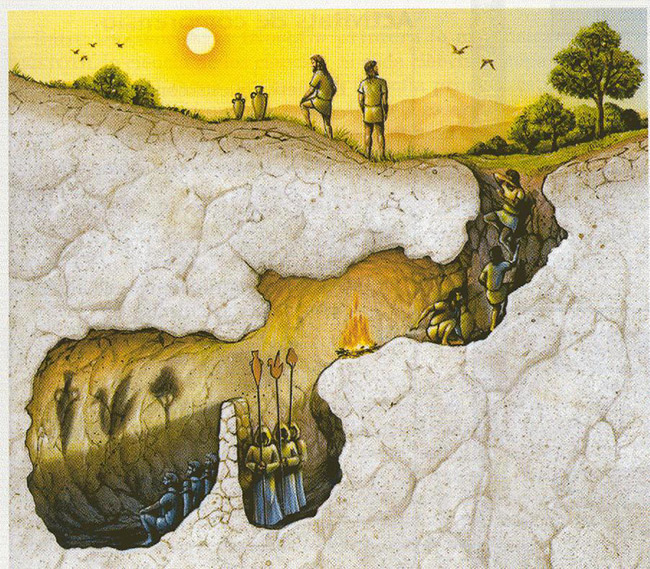It seems to us that what is happening in Armenia is unique and unprecedented, that only our people are wise or not wise, that only our rulers are qualified or vice versa, but the situation in which our society now lives was described long ago: 2,400 years ago.
The Greek philosopher Plato, as is well known, often presented his views in the form of allegories (in his language, metaphors).
The most famous is the cave allegory in his work “The State.” The chained detainees sit in a cave with their backs to the door, watching the shadows move with interest as people or animals pass by the door from time to time. They are convinced that this is the reality. Suddenly one of the prisoners is released, goes out into the world, and sees the sun and real objects under its light. Then, he returns to the cave, and after he starts seeing poorly in the dark because of the sun, he does not notice the shadows with which the people sitting in the cave are so obsessed. The latter think that their friend is blind, and no matter how much the latter persuades them to get out of the cave, they do not agree at all, thinking that they will also go blind. They prefer to stay in a world of comfortable shadows. Plato thus criticized the Athenian democracy of his day, arguing that the actual application of that regime presupposed a society of enlightened, free people.
Plato’s allegory has many interpretations to which a whole book can be dedicated. But I suggest “flying” over the millennia and coming to the United States in the 1920s. Why here? Because it was during this period that the West began to realize that all adult citizens in their countries had received or would receive in the near future the right to vote, that is, to form a government. During those years, the American publicist and theorist Walter Lippmann put forward the following interpretation of Plato’s allegory. Since most of these citizens do not have enough knowledge in all cases, and they live with prejudices, it is not necessary to try to get them out of the cave, but, on the contrary, to create for them such an interesting and tempting world of shadows that they will never want to leave that cave. In the 1920s, when the first means of mass communication- radio- was invented, various forms of public opinion and propaganda began to emerge, which, of course, became more and more perfected over the next 100 years with the development of new means of communication.
Read also
These forms were alien to Robert Kocharyan and Serzh Sargsyan, both of whom had a post-Soviet mentality. Their ideas about propaganda were at the level of the communist-era Vremya TV program, which formally said “what was needed,” but no one believed it.
Since 2010, when social networks began to develop, the opposition, and from 2018, the government, began to use technologies refined for 100 years and, as we can see, has achieved impressive success. “Robbery,” “Sashik,” “Lfik,” “backpack,” “steel mandate,” “dictatorship of the law” (borrowed from Lebed and then Putin’s PR managers), and “hammer” – these are all “shadows” that occupied and continue to occupy those sitting in the “Armenian caves.”
As a result, we have a large number of citizens who are convinced that Artsakh was handed over by “that blind one and that Turk” that Kocharyan calls Aliyev and asks him to fire at the border and advance to discredit Pashinyan, that the same Kocharyan turns off the villagers’ irrigation water, the citizens’ electricity, etc. People live in a world of “shadows,” and that, of course, is mainly in favor of the current government. Bringing people to the world is not an easy task. I think it is necessary to gradually increase the light and raise the level of literacy without touching the stereotypes formed over the decades.
But it would also be wrong to say that the “cave” only benefits the government. There are, for example, issues where the government is absolutely right, but people, due to their stereotypes and prejudices, do not understand it. For example, the government says, “Get vaccinated, everyone,” but the majority of citizens live according to the myths about getting vaccinated.
Aram Abrahamyan























































